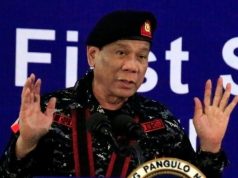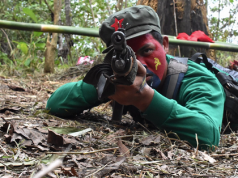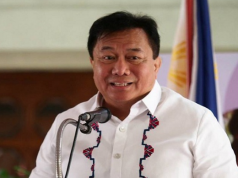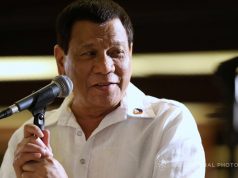MANILA, Philippines — Former Human Rights Commission chairperson Loretta Ann “Etta” Rosales on Friday filed before the Supreme Court the third petition seeking to nullify the full-year extension of martial law and the suspension of the privilege of the writ of habeas corpus in Mindanao.
Echoing the arguments of the two other petitioners, Rosales said there was no longer factual basis to extend martial law and suspend the privilege of the writ of habeas corpus in Mindanao since President Rodrigo Duterte already declared last October that Marawi City — the center of skirmishes between government troops and ISIS-inspired Maute group — had already been liberated.
In her 33-page petition, Rosales said a threat of violence is not the requisite stated under the Constitution to justify martial law.
She said that under the Constitution, a suspension of the writ of habeas corpus or the declaration of martial law can only be done in case of invasion, rebellion or when the public safety requires it.
Rosales said the same provision of the Constitution, Article VII Section 18, states that to prevent or suppress lawless violence, invasion or rebellion, the President’s calling-out power should be exercised — meaning the military will be called upon to prevent such violence, rebellion or invasion.
In this case, however, petitioner said the government itself had declared that the Marawi siege was already over and the martial law had been declared to stop the possible regrouping of terror groups.
“Actual invasion or actual rebellion presupposes the existence of a theater of war that requires the imposition of military law on the civilian population.Thus, in the absence of an actual invasion or actual rebellion, necessarily, there is no factual basis for extending martial law,” Rosales said, adding that allowing the extension for such reason would justify the declaration of martial for every mop-up operation by the military.
Rosales said the high court should not tolerate such justification to declare martial law.
“The Honorable Court is the last institution that can prevent the misuse and ‘normalization’ of martial law for ordinary peacekeeping and governance activities,” she added.
“With all due respect, and without diminishing the threat posed by any of the foregoing, none of these constitute actual rebellion or actual invasion. Moreover, it mistakes the distinction between the need for military force which is effected through the use of the calling out powers of the President, on one hand, and the need for imposing martial law on the civilian population, on the other,” the petition stated.
The petition added that martial law cannot be imposed or extended for “preventive reasons,” noting that the framers of the 1987 Constitution deleted imminent danger as one of the grounds for declaring such emergency rule.
Rosales’ counsel, former solicitor general Florin Hilbay, said they had asked the SC to consolidate the petition with that of six opposition congressmen led by Albay Rep. Edcel Lagman and activist groups and militant lawmakers which will be heard in oral arguments on January 16 and 17.
Rosales’ petition named President Duterte, Defense Secretary Delfin Lorenzana, Armed Forces chief of staff General Rey Guerrero, Philippine National Police chief Director General Ronald Dela Rosa, Senate President Aquilino Pimentel III and Speaker Pantaleon Alvarez as respondents.
No constitutional basis
Both the minority bloc from Congress led by Lagman as well as human rights advocates and the National Union of Peoples’ Lawyers (NUPL) have earlier maintained that there is no more need to extend the martial law especially that the government itself declared that the Marawi seige is over.
The first petition was filed on Dec. 27 led by the opposition lawmakers bloc, led by Albay Rep. Edcel Lagman asked the high court to issue a temporary restraining order (TRO) or a writ of preliminary injunction to stop the implementation of the challenged re-extension pending adjudication of their petition.
The other petitioners are Representatives Tomasito Villarin, Edgar Erice, Teddy Brawner Baguilat, Jr., Gary Alejano and Emmanuel Billones.
In their petition, the six opposition congressmen argued that there is no actual rebellion in Mindanao and that threats of violence and terrorism by remnants of terrorist groups do not constitute a constitutional basis for extension because “imminent danger” has been deleted as a ground for imposing martial law under the 1987 Constitution.
The second petition filed on Monday (Jan. 8) and was filed by National Union of Peoples’ Lawyers (NUPL) and party-list congressmen such as Carlos Zarate (Bayan Muna), Emmie De Jesus (Gabriela), Arlene Brosas (Gabriela), Ariel Casilao (Anakpawis), Antonio Tinio (ACT Teachers), and Sarah Elago (Kabataan) said the extension would give way to “alarmingly intensified and increased human rights violations” allegedly aimed at “quelling legitimate redress of grievances against the government.”
It also said martial law was extended despite government admission that the Marawi siege is over in October last year.
The high court has already consolidated the first two petitions against martial law extension and has set an oral argument on Jan. 16 and 17.
Lack of merit
The Office of the Solicitor General (OSG) is expected to represent the respondents led by President Rodrigo Duterte in the hearings.
On Monday, the OSG asked the Supreme Court (SC) to dismiss the petition filed by opposition lawmakers assailing the constitutionality of the full-year extension of martial law in Mindanao.
In a 58-page comment, Solicitor General Jose Calida said the petition filed by the opposition lawmakers bloc, led by Lagman, must be dismissed due to lack of merit, noting that it was imputing grave abuse of discretion by Congress in extending the effectivity of martial law in Mindanao.
He stressed that the SC could not issue a TRO as prayed by petitioners because such injunctive relief would unduly interfere with the congressional power to extend the declaration of martial law by the President.
Calida also pointed out that petitioners failed to fulfill their burden of proving by evidence that there was no factual basis to extend martial law in Mindanao and that Congress acted contrary to the Constitution in approving the extension.
He also cited technical ground for the dismissal of the petition, particularly the “terrible blunder” of petitioners of not attaching the assailed joint resolution of Congress in their petition
On Dec. 13, a total of 240 members of Congress voted to approve to extend martial law in Mindanao, while only 27 voted against it. The approved extension took effect on Jan. 1, 2018 until Dec. 31, 2018.
In a 240-27 vote, both chambers of Congress voted to approve Duterte’s request to extend the declaration of martial law in Mindanao until the end of 2018.
The high court had previously voted to affirm the constitutionality of Mr. Duterte’s Proclamation No. 216, which placed the entire Mindanao under martial law until Dec. 31 following the violent attack of the Islamic State-allied Maute terror group in Marawi City on May 26.








